Gain insight into the downfall of Samuel's sons, a tale of corruption and lost integrity, prompting a monumental shift in Israel's leadership.

Samuel Sons in the Bible
When you explore the biblical narrative, you stumble upon Samuel, a revered prophet, whose sons, Joel and Abijah, strayed from their father's righteous path into corruption.
As judges over Israel, their actions deviated significantly from Samuel's legacy, engaging in bribery and perverting justice.
This shift in behavior not only tarnished their reputation but also played a crucial role in Israel's demand for a monarch, marking a pivotal transition in its governance.
You're left to ponder how such promising beginnings led to disappointing outcomes, and what implications this holds for understanding leadership and integrity in a broader context.
Key Takeaways
- Samuel's sons, Joel and Abijah, failed to uphold their father's legacy of integrity and spiritual leadership.
- Their involvement in corruption exemplified a deviation from the ethical values expected in Israelite leadership.
- Joel and Abijah's actions contributed to the Israelites' demand for a monarchy, marking a significant shift in governance.
- Despite their prestigious lineage, they underscore the importance of personal accountability and moral conduct in leadership roles.
Samuel's Legacy
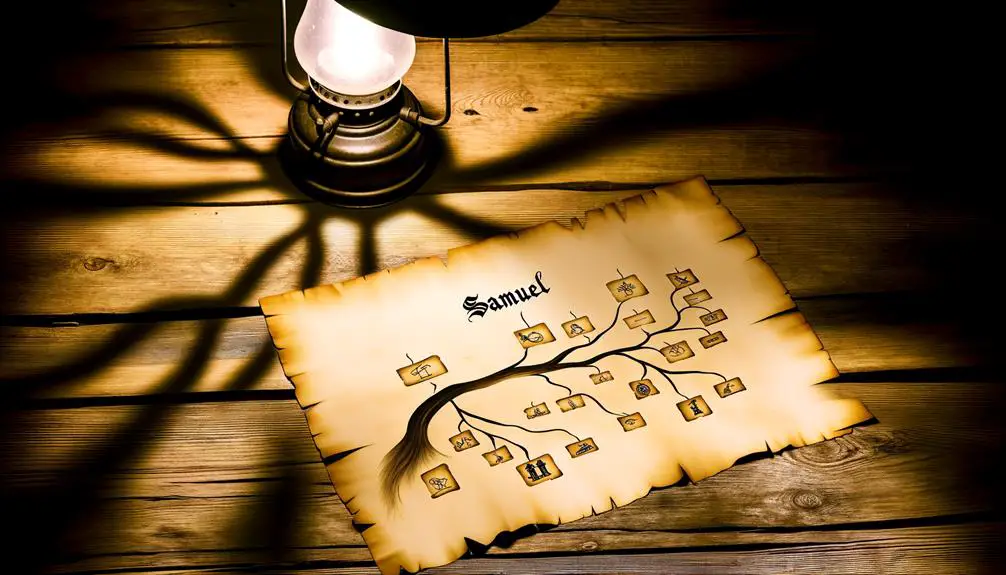
Samuel's legacy, a testament to his profound influence on Israel's history, reveals a complex narrative marked by divine guidance and human imperfection. As you delve into the intricacies of his story, you'll find that Samuel's life embodies the tensions between prophetic lineage and the challenges of upholding divine mandates amidst personal failings. His role as a bridge between the era of judges and the establishment of the monarchy underlines the pivotal position he holds in biblical narratives, guided by an unwavering commitment to follow God's direction.
The concept of prophetic lineage, crucial in understanding Samuel's legacy, extends beyond mere biological descent. It encompasses the transmission of divine authority and responsibility from one generation to the next. Samuel, having been dedicated to God's service from birth, epitomizes this lineage, standing as a paragon of divine guidance. His life's work, marked by anointing the first two kings of Israel, underscores the weight of his influence, guided by direct communication with God.
However, Samuel's legacy isn't devoid of human imperfection. Despite his profound connection with the divine, his attempts to instill these values in his sons were met with limited success, exposing the complexities inherent in the prophetic role. This juxtaposition between divine guidance and human failure offers a nuanced lens through which to view his contributions, highlighting the delicate balance between spiritual authority and the realities of human limitations.
In essence, Samuel's story invites you to consider the profound impact of prophetic lineage shaped by divine guidance, while also acknowledging the inherent challenges posed by human frailty.
Joel and Abijah's Early Life

Delving into the early lives of Joel and Abijah, one finds a narrative deeply intertwined with the complexities of prophetic inheritance and the expectations of divine service. As sons of Samuel, one of the most revered prophets in Israel, they were thrust into a world where family dynamics and religious duties were inseparably linked. Their upbringing, undoubtedly, was steeped in the traditions and laws that governed their society, shaping them from a young age to assume roles that their lineage dictated.
The nature of their early education would have been rigorous, instilling in them an understanding of the Torah and the intricate rituals associated with worship in the temple. You can imagine the weight of expectation resting on their shoulders, being direct descendants of a figure as pivotal as Samuel. This responsibility wasn't merely familial; it was a matter of national importance, as their roles were seen as extensions of their father's spiritual leadership.
Yet, it's essential to recognize that the transition from being the sons of a prophet to holding positions of religious significance themselves was fraught with challenges. The family dynamics at play, particularly the influence of their father's reputation, set a high bar for their conduct and service. Their early life wasn't just about learning religious duties; it was about understanding how to navigate the expectations placed upon them by their heritage and their community.
This period of their lives laid the groundwork for their later actions and decisions, which, as history shows, were met with mixed outcomes. The balance between upholding their familial legacy and adhering to the religious duties expected of them was a delicate one, marking their early life as a time of significant personal and spiritual development.
The Role of Judges in Israel
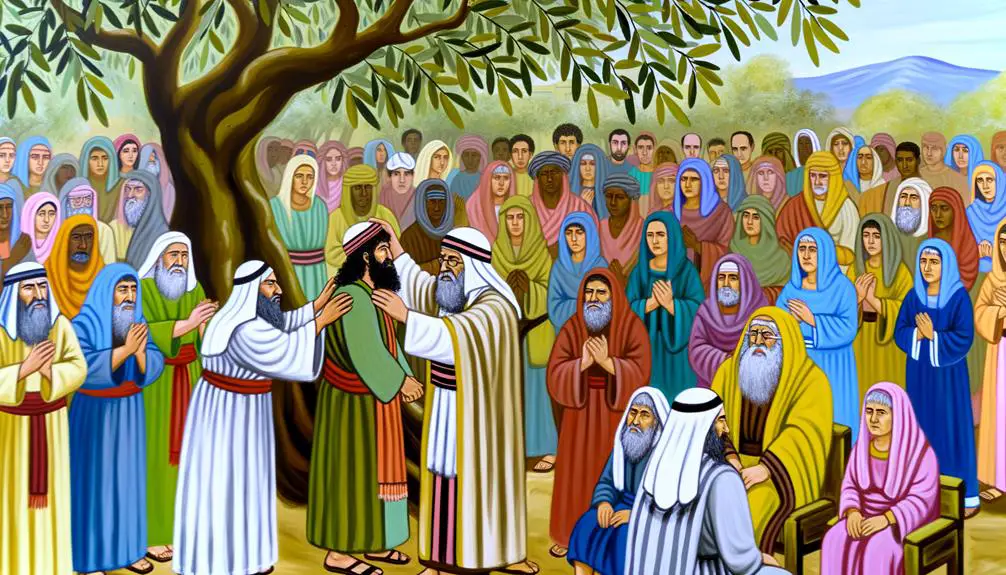
Reflecting on the early lives of Joel and Abijah under their father Samuel's tutelage, it's crucial to understand the broader context of their expected roles, given the significant function judges held in Israel during this period. The era of the judges was a time when Israel wasn't yet a unified nation but rather a tribal confederacy. This structure was inherently decentralized, with each tribe largely governing itself. However, when threats arose, it was the judges who stepped up, not just as legal arbitrators, but as military leaders and unifiers of the tribes.
Judges in this context were pivotal figures, raised up by God to deliver Israel from its oppressors and lead the people in military campaigns. Their role was multifaceted; they served as both spiritual leaders and military commanders, embodying the link between divine will and national survival. The judges' ability to rally the tribes for military campaigns was crucial, as the threats Israel faced often came from more organized and technologically advanced adversaries.
Moreover, judges were seen as instruments of divine justice, ensuring that the covenant between God and Israel was upheld. Their leadership wasn't hereditary but divinely appointed, emphasizing the theocratic nature of Israelite society at the time. This period underlines a time when leadership wasn't just about political acumen or military might but deeply intertwined with spiritual fidelity and moral integrity.
Understanding this context sheds light on the expectations placed on Joel and Abijah, as the sons of Samuel, a judge whose leadership had been instrumental in transitioning Israel from a tribal confederacy to the cusp of monarchy.
Corruption Among the Leaders

Despite the high expectations placed upon them, Joel and Abijah's tenure as leaders was marred by widespread corruption, deviating significantly from their father's legacy of integrity and spiritual leadership. You'll observe that their actions not only undermined the moral fabric of Israelite society but also posed severe ethical dilemmas. Their governance starkly contrasted with the principled leadership exemplified by their father, Samuel, who was known for his unwavering commitment to justice and the law of God.
Their involvement in corrupt practices, particularly in taking bribes and perverting justice, highlights a critical failure in leadership accountability. This scenario presents a complex challenge in the realm of ethical leadership, where personal gain was prioritized over the welfare of the people. You must recognize that their failure wasn't just in the acts of corruption themselves but in the erosion of trust and moral authority that ensued.
Analyzing their tenure, it becomes evident that the lack of accountability mechanisms and the absence of checks and balances significantly contributed to their downfall. This situation underscores the importance of establishing robust systems for leadership accountability to prevent the emergence of corruption. It also emphasizes the need for leaders to embody ethical values and integrity, serving as exemplars to their followers.
In dissecting the corruption among these leaders, you're invited to reflect on the broader implications for leadership in any context. The ethical dilemmas and failures of Joel and Abijah serve as a cautionary tale about the dangers of power unchecked by moral and ethical considerations, highlighting the perennial need for leaders to be held to the highest standards of accountability and integrity.
The People's Cry for a King
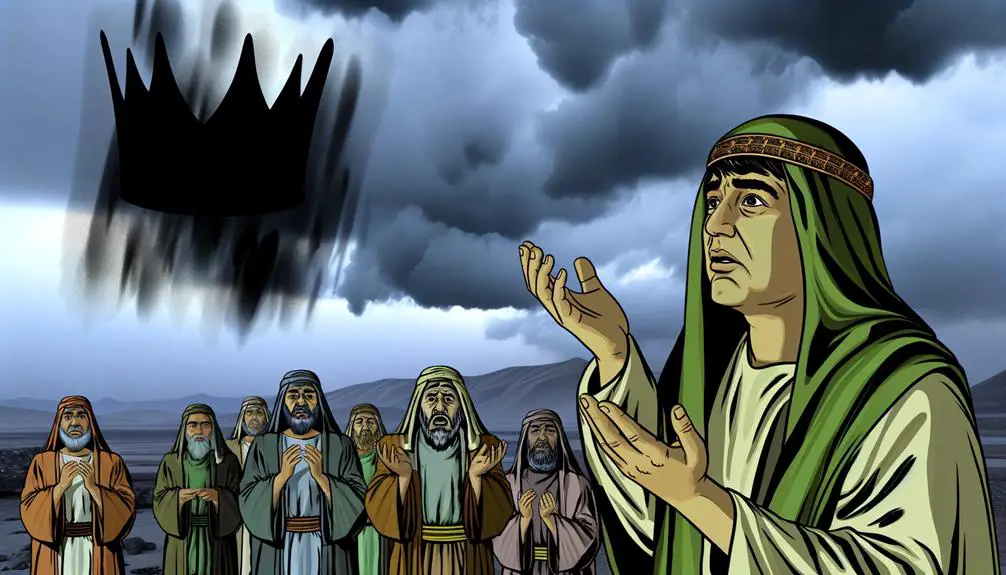
You observe a pivotal moment in Israel's history when the nation, disillusioned by corruption among its leaders, vehemently demands a monarchy, rejecting God's unique kingship over them. This act of defiance sets the stage for Samuel's prophetic warning, emphasizing the dire consequences of their choice, highlighting the inherent risks of placing absolute power in human hands.
Your analysis must consider the complex interplay between divine sovereignty and human agency, as this narrative unfolds against the backdrop of Israel's quest for political stability and identity.
Israel Rejects God
In a pivotal moment of biblical history, Israel's demand for a king signifies a profound rejection of God's direct leadership, illustrating a shift towards desiring a tangible, human authority. This moment underscores a complex interplay between Divine Sovereignty and Human Agency, where the Israelites, despite recognizing God's sovereign rule, assert their agency in a manner that seemingly undermines it.
They're not just asking for a leader; they're essentially voting for a radical change in governance, from a theocracy to a monarchy. This request doesn't merely reflect dissatisfaction with Samuel's sons' corrupt leadership; it's a fundamental challenge to the way God chose to rule His people.
Here, the Israelites' desire for conformity with neighboring nations reveals a deeper struggle with faith and trust in the unseen, omnipotent God.
Samuel Warns Israel
Upon hearing the people's demand for a king, Samuel delivers a stark warning about the consequences of abandoning God's unique form of governance. This divine warning isn't merely about the risks of monarchy but speaks to the heart of Israel's national identity.
Samuel's cautionary words underscore the central tenet that their distinction as a nation wasn't rooted in human leadership but in their direct covenant with the divine. By choosing a king, they weren't just altering their political landscape; they were risking the essence of their uniqueness.
This act of defiance against the divine order is depicted as a pivotal moment, a turning point that could lead to the erosion of their spiritual and communal fabric. Samuel's warning is profound, highlighting the profound implications of their request, far beyond the immediate political ramifications.
Samuel's Reaction to His Sons' Failures

Grasping the gravity of his sons' failures, Samuel faced a profound disappointment that significantly influenced his leadership and spiritual guidance within Israel. This moment wasn't just a personal crisis; it was a pivotal point that underscored the challenges of parental guidance in the face of public scrutiny. Samuel, a revered prophet and judge, found himself in a maelstrom of emotional turmoil, torn between his unconditional love for his sons and his unwavering commitment to his divine duty.
His reaction wasn't marked by denial or blind defense of his offspring. Instead, Samuel acknowledged their shortcomings, a testament to his integrity and dedication to truth. This acknowledgment, however, didn't come easy. It demanded a deep introspection about where the lines between personal failure and public responsibility intersect. Samuel's emotional turmoil wasn't just about the personal disappointment of seeing his sons stray from the righteous path he'd envisioned for them. It was also about grappling with the hard truth that despite his best efforts in providing spiritual and moral guidance, free will and personal choices ultimately shaped his sons' actions.
This phase in Samuel's life highlights a critical lesson on the limitations of parental guidance and the painful acceptance of one's inability to control the outcomes of those they mentor. It's a stark reminder of the complex interplay between personal values, public service, and the unpredictable nature of human behavior. Samuel's response to his sons' failures, thus, serves as a poignant reflection on leadership, morality, and the enduring challenge of balancing personal attachment with professional obligations.
Transition to Monarchy

Samuel's acknowledgment of his sons' failures set the stage for a pivotal shift in Israel's governance, as the nation transitioned from a theocratic judgeship to a monarchy. This period in Israel's history is marked by profound transformation, driven by the people's demand for a king to lead them, mirroring the political structures of neighboring nations. Samuel's initial resistance to this idea highlights the tension between divine governance and human political ambition. Yet, the unfolding of events reveals Samuel's crucial, dual role in this transition: as a prophet who delivers God's royal prophecy and as a kingmaker who anoints the first kings of Israel.
Analyzing this transition, it's evident that Samuel's acceptance of God's command to anoint a king represents a significant theological and political pivot. The royal prophecy, initially met with ambivalence, becomes a cornerstone for Israel's future, symbolizing divine endorsement of monarchy while ensuring that kingship remains within the framework of God's sovereignty. Samuel's kingmaker role underscores his pivotal position in Israel's shift to monarchy. By anointing Saul and later David, Samuel not only fulfills God's command but also bridges the gap between the era of judges and the era of kings.
This transition period, facilitated by Samuel's actions and guided by divine prophecy, marks a critical juncture in Israelite history. It reflects the complex interplay between divine will, prophetic authority, and human political evolution, setting the foundation for the monarchy that would shape the future of Israel.
Lessons From Their Lives
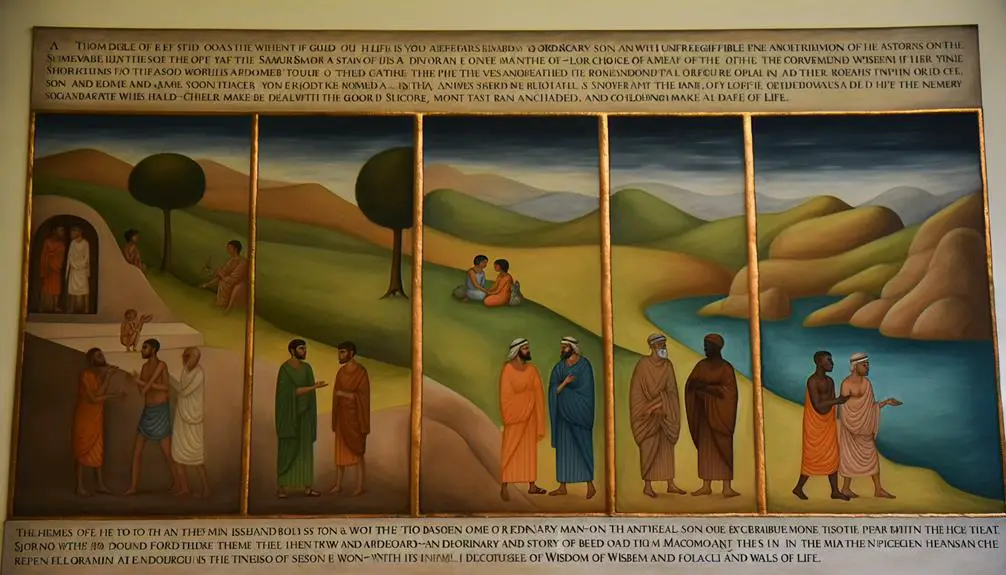
Reflecting on the lives of Samuel and his sons, it's crucial to recognize how their personal failings and strengths offer profound lessons on leadership, divine guidance, and the complexities of human governance. As you delve deeper, you'll understand the pivotal role of parental guidance and the elusive concept of spiritual inheritance.
Aspect |
Samuel's Leadership |
Sons' Missteps |
|---|---|---|
Parental Guidance |
Exemplary dedication to nurturing spiritual leadership. |
Failed to absorb or replicate their father's integrity. |
Spiritual Inheritance |
Embodied divine wisdom and justice. |
Squandered their spiritual legacy through corruption. |
Human Governance |
Balanced divine commands with the people's needs. |
Allowed personal greed to overshadow justice. |
Leadership Lessons |
Demonstrates the necessity of aligning with divine guidance. |
Highlights the pitfalls of neglecting moral and spiritual responsibilities. |
This table succinctly encapsulates the dichotomy between Samuel and his sons, underlining the importance of instilling virtues and the dangers of deviating from them. Samuel's life illustrates the profound impact of aligning leadership with divine guidance, showcasing how adherence to spiritual principles can forge a legacy of justice and wisdom. Conversely, his sons' lives serve as a cautionary tale about the consequences of neglecting parental guidance and spiritual inheritance. Their failure to embody their father's virtues led to a governance mired in corruption and ultimately, their rejection by the people they were meant to serve.
Drawing lessons from their lives, it's apparent that leadership transcends mere authority; it demands a commitment to moral and spiritual principles. This narrative underscores the significance of parental guidance in shaping leaders and the imperative of safeguarding one's spiritual inheritance to ensure just and divine-aligned governance.
Frequently Asked Questions
How Did Samuel's Relationship With His Sons Compare to Eli's Relationship With His Own Sons, Considering Both Sets of Sons Strayed From Their Fathers' Teachings?
You're examining how two leaders' relationships with their wayward sons reflect on parental legacy and leadership failures. Both sets of sons veered from their fathers' teachings, yet the real focus is on the fathers' responses to these deviations.
This comparison reveals a deeper layer of accountability and the complexities of passing on values. It's a nuanced look at how personal failings can overshadow intentions, challenging the ideal of infallible leadership.
Were There Any Specific Rituals or Ceremonies That Samuel Performed at the Birth of His Sons, Joel and Abijah, That Were Unique or Significant in the Cultural Context of the Time?
When reflecting on the ceremonial significance of birth rituals, it's vital to consider the cultural practices of the time.
Unfortunately, there's no specific mention of unique ceremonies Samuel performed for Joel and Abijah's births.
However, given the era's traditions, it's likely standard practices were observed, which might've included offerings and dedications, aligning with the period's religious norms.
These acts would have underscored the family's devotion and the children's future roles.
Did Joel and Abijah Have Any Siblings, and if So, What Roles or Mentions Do They Have in Biblical Texts or Historical Accounts?
Diving into the depths of sibling dynamics, you'll find no mention of Joel and Abijah having siblings. Their story, encapsulated within the biblical narrative, doesn't branch out to other brothers or sisters, focusing instead on their roles within their father's parental legacy.
This singular focus allows for a deeper examination of their actions and impacts, rather than spreading the narrative thin across multiple family members, showcasing a concentrated view of lineage and legacy.
How Did the Communities Under the Jurisdiction of Joel and Abijah React to Their Corrupt Practices, Beyond Seeking a Monarch to Lead Them?
You're delving into how communities reacted to corrupt practices, beyond just wanting a monarch. They didn't sit back quietly. Instead, there was significant community dissent.
People likely pushed for legal reforms to safeguard against such corruption in the future. This wasn't just about replacing leadership; it was about fundamentally changing the system to prevent similar issues.
Your investigation shows a community actively seeking structural change, not merely a change in figureheads.
Is There Any Archaeological Evidence or Findings That Support the Existence of Joel and Abijah, or That Shed Light on the Era of Samuel's Judgeship in Israel?
You're looking for archaeological evidence or findings about a specific period, focusing on the use of archaeological methodologies and cultural artifacts to illuminate history.
Sadly, there's little direct archaeological evidence that pinpoints the existence of specific individuals from that era or details about their lives.
However, cultural artifacts and general archaeological findings can offer insights into the broader societal and cultural contexts of the time, helping to understand the historical backdrop against which these figures would have lived.
Conclusion
In analyzing Samuel's sons, Joel and Abijah, it's evident that leadership's moral integrity is paramount. Despite their heritage, they succumbed to corruption, diverging significantly from their father's righteousness.
Interestingly, Samuel judged Israel for over 40 years, yet his sons' brief leadership period led to a monumental shift towards monarchy. This underscores the critical impact of ethical leadership on societal structures.
Their story vividly illustrates how a legacy of virtue can be swiftly eroded by successors' misconduct, shaping history's course.

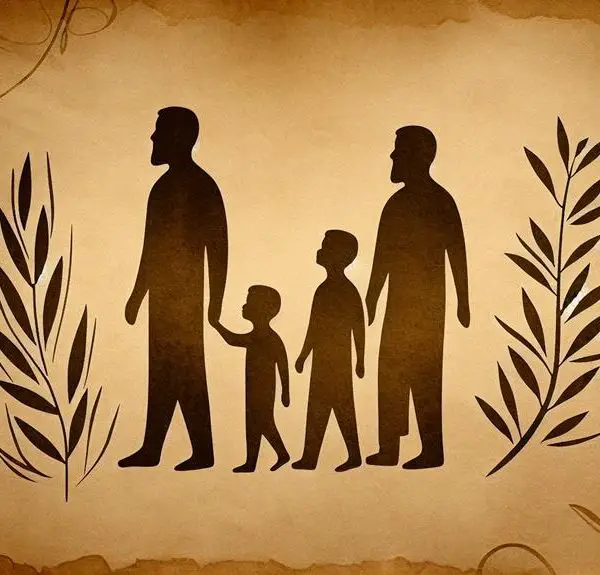

Sign up